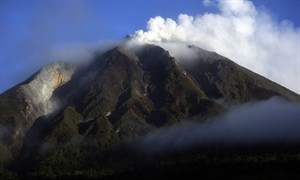More Explosions at Sinabung

Activity at Sinabung continues to be a cause for concern as the volcano experienced another set of explosions overnight. Surono, head of the Indonesian Center for Volcanology and Geological Disaster Mitigation described the current activity: “Constant tremors were felt since yesterday and, between 4:38 and 4:51 a.m. this morning, the volcano erupted, shooting thick, hot ash 3,000 meters (1.9 miles) to the sky.” So, it seems that the volcano is continuing to have these relatively small, ash-rich explosions that might be the continuation of this “conduit-clearing”. Many people living near the volcano that did not evacuate or returned since the first explosion had to leave due to these new explosions. Eruptions reader Typhoon Fury sent in some video he shot on the scene of the preparations/precautions that the locals are taking for the ash – and remember, ash in a danger in many different ways beyond inhalation. The weather is poor right now around the volcano, so seeing the eruption is difficult but some reports have ash reaching as high as ~3 km / 10,000 feet. In one of those “lost in translation” moments, there was an article warning the local Karo people about “lava floods”, which is a little misleading. The report/warning is about volcanic mudflows or lahars generated by the mix of volcanic ash and water – they can be generated by large amounts of rain falling on loose, recently erupted ash, but are a significant hazard. The best thing to do if you are in the path of a lahar is to get to higher ground, and fast, as lahars will tend to stay confined to valley/channel bottoms. At this point, it is still unknown what the end result of this activity might be: a run-up to a larger event or eventual petering out of the activity.
UPDATE: Here is some Indonesian TV news coverage (video) of the recent explosions (thanks to Eruptions reader Jeb).
Top left: Sinabung with a steam plume on September 2, 2010.




